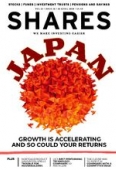Archived article
Please note that tax, investment, pension and ISA rules can change and the information and any views contained in this article may now be inaccurate.
The rise of the regulators

Led by the UK’s Competition and Markets Authority (CMA), anti-trust regulators around the world are having a bigger say than ever in corporate affairs. While this is good news for consumers, for investors the regulators represent another level of risk and complexity.
There are many current examples involving UK-quoted shares such as news last week that the CMA was opening a full investigation into last September’s acquisition of Mitie’s (MTO) pest control business by Rentokil Initial (RTO).
The regulator says that because the two firms are among the top four suppliers of pest control services in the UK, ‘there could be a substantial reduction in competition, which may lead to higher prices or reduced quality for customers that primarily use a single provider across the whole or a large part of the UK’.
To put this into perspective, Rentokil made 42 pest control acquisitions in 22 countries last year from the Dutch Antilles and Indonesia to the UAE and not one of them was considered likely to lead to reduced competition, except for the
Mitie deal.
THE REGULATOR SENDS ITS REGARDS
The CMA says it works to promote competition for the benefit of consumers, both within and outside the UK. ‘Our aim is to make markets work well for consumers, businesses and the economy,’ it adds.
And it has certainly been a busy time for the watchdog. Last June it opened a review of the funeral market amid concerns that ‘prices had been increasing substantially’. It subsequently launched a full-blown investigation, sending shares in funeral operator Dignity (DTY) close to five-year lows.
In December it announced a review of pricing across mortgages, car and home insurance, broadband and mobile services, where it found that loyal customers were being charged ‘significantly’ higher prices than new customers.
In its preliminary report it accused firms of ‘damaging practices’ designed to ‘exploit unsuspecting customers’ with stealth price rises, costly exit fees and overly complicated processes to cancel or switch providers.
Recently it has looked into price fixing in the market for rented groundwork products used in big, largely publicly-funded infrastructure projects, and has singled out VP Group (VP.) for further investigation. VP shares collapsed 15% on the news.
It has also warned travel booking firms over their cancellation policies and fees, and has called for the Big Four accountancy firms to split their audit units from their other group operations, drawing anger from the CBI business lobby group.
Responding to the CMA’s audit recommendations, CBI president John Allan says: ‘The UK’s position as a world leader on corporate governance is highly-prized. But with the eyes of the world on the UK, some CMA proposals risk damaging that reputation.
‘Mandating joint audits will add cost and complexity for business with no guarantee of better outcomes. Operational splits could restrict access to the skills required to carry out complex audits,’ he adds.
UNEXPECTED PROBE IN BAGGING AREA
One of the most high-profile CMA cases is the proposed merger between supermarkets Sainsbury (SBRY) and Asda.
In late February the regulator confirmed it was launching a full investigation into the merger on the basis that shoppers could face ‘higher prices or a worse quality of service’ while the supermarkets would wield excessive ‘buyer power’ over their suppliers. Sainsbury’s shares dropped 19% on the news.
A verdict is due on or by 30 April but it seems unlikely that the merger will be approved without sizeable concessions, which could scupper the economics and the rationale behind the deal altogether.
THE MUSCLE FROM BRUSSELS
The EU’s competition commissioner, Margrethe Vestager, is renowned for taking on big business and has become one of Europe’s most influential politicians.
Earlier this year Vestager fined Google €1.49bn for restricting third party advertising services on displaying search ads. That brings the total antitrust fines against Google to over €8bn.
France’s Alstom and Germany’s Siemens, two of Europe’s largest industrial firms, recently fell foul of EU anti-trust rules over their proposal to combine their rail operations.
Even though a deal was backed by the French and German governments who want to form a European champion capable of competing globally, the commissioner opposed the merger on the basis that it would pose ‘serious competition problems’ for the firms’ European customers and could lead to ‘higher prices, less choice and less innovation’.
Germany’s beleaguered car makers are also under scrutiny after the EU commissioner launched a probe into whether they conspired to limit the development of clean emissions technology.
Already facing billions of euros in fines following the ‘Dieselgate’ scandal, the ‘circle of five’ – Audi, BMW, Daimler, Porsche and VW – are being investigated for acting jointly to restrict the development of engine technology which would have reduced harmful emissions.
The industry has already been investigated for operating cartels in the manufacturing of parts such as bearings, brakes and spark plugs.
THE US REGULATOR IS JOINING IN
The US Justice Department is reported to have waded
into the $26bn merger between T Mobile US and Sprint this month to tell both parties that it has concerns about the structure of the deal.
The companies insist that the merger will allow them to invest more money faster in 5G networks to compete more effectively with AT&T and Verizon.
However critics say that reducing the number of national mobile operators would be negative for consumers.
Shares of Sprint fell 9% on the news while T Mobile shares fell 4%, illustrating again the danger for investors in companies which wittingly or unwittingly fall foul of the regulators.
Important information:
These articles are provided by Shares magazine which is published by AJ Bell Media, a part of AJ Bell. Shares is not written by AJ Bell.
Shares is provided for your general information and use and is not a personal recommendation to invest. It is not intended to be relied upon by you in making or not making any investment decisions. The investments referred to in these articles will not be suitable for all investors. If in doubt please seek appropriate independent financial advice.
Investors acting on the information in these articles do so at their own risk and AJ Bell Media and its staff do not accept liability for losses suffered by investors as a result of their investment decisions.

 magazine
magazine









